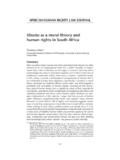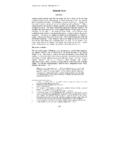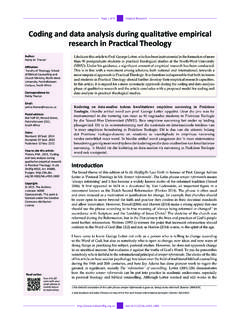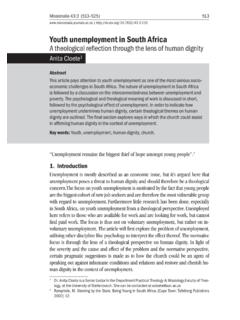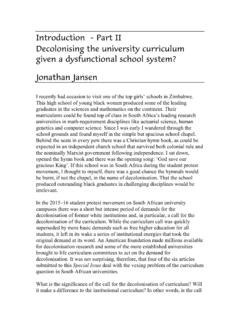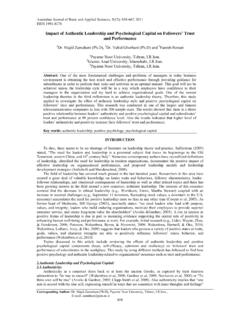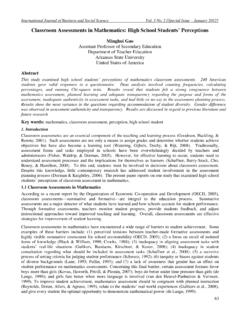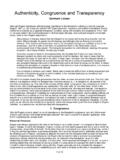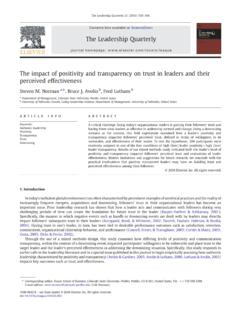Transcription of Leadership coaching experiences of clients with Alexithymia
1 Page 1 of 10 Original Research Leadership coaching experiences of clients with Alexithymia Author: Orientation: Leaders who find it difficult to connect emotionally with colleagues are often Frans Cilliers1 seen as incompetent, the idea that they may suffer from Alexithymia an inability to feel . Affiliation: is not taken into account. This coaching model seemed to be not successful in changing this 1. Department of Industrial behaviour pattern. and Organisational Psychology, University of Research purpose: The purpose of the research was to describe the coaching experiences of South Africa, South Africa leaders with symptoms of Alexithymia and to formulate hypotheses around their Leadership experiences . Correspondence to: Frans Cilliers Motivation for the study: Effective Leadership is strongly associated with emotional connections with colleagues.
2 Leaders suffering from Alexithymia , struggle with making these Email: connections. It was thought that coaching might help them bridge the gap towards building effective relationships. Postal address: PO Box 392, Unisa 0003, Research design, approach and method: A qualitative research design using case studies was South Africa used. Three participants underwent 10 months of systems psychodynamic Leadership coaching , including role analysis. Researcher's field notes and participant essays were discourse analysed. Dates: The researcher's unconscious experiences were included in the interpretations. Received: 31 May 2011. Accepted: 20 Dec. 2011 Main findings: Five themes manifested themselves namely, leaders' difficult experiences Published: 26 Mar. 2012. with coaching , the dynamics underlying their normative, experiential and phenomenal roles How to cite this article: and the coach's unconscious experiences affecting the relationship.
3 The research hypothesis Cilliers, F. (2012). Leadership referred to the differences between the role parts and the resulting anxiety. coaching experiences of clients with Alexithymia . Practical/managerial implications: This coaching model did not provide sufficient SA Journal of Industrial opportunities for the participating leaders with regard to emotional reactivity and regulation. Psychology/SA Tydskrif vir Bedryfsielkunde, 38(2), Art. Contribution/value-add: The research created awareness of how Alexithymia amongst leaders #995, 10 pages. http:// manifests in organisations. Unfortunately the coaching was unsuccessful in addressing the emotional task. Other ways need to be explored. Introduction Some leaders find it difficult to form emotional connections with colleagues because of the presence of Alexithymia , an inability to feel emotionally.
4 Such leaders are often seen as incompetent and sent for coaching ' to address their cold and aloof style and lack of empathy'. An in-depth understanding of the behaviour of these leaders and the nature of Alexithymia may assist in realising that coaching about emotionality may not be the answer to this Leadership matter. Leadership is popularly defined as a process whereby an individual influences a group of individuals to achieve a common goal (Northouse, 2004). In all its components of process, influence, interpersonal and group context, and goal attainment, Leadership is in its essence an interpersonal activity between leader and follower (Nohria & Khurana, 2010). The Leadership literature classifies Leadership competencies as problem-solving skills, social-judgement skills and knowledge (Northouse, 2004).
5 Where both problem solving and knowledge rely heavily on intellectual and cognitive abilities, the social aspect refers to the understanding of behaviour and social systems, understanding of attitudes (thinking, feeling and actions), sensitivity to feelings through empathy and effective communication around emotional, social and work matters. Kets de Vries (2006) included the awareness of and effectiveness in dealing with behavioural dynamics such as conflicts, power relations, resistances and other defensive structures. 2012. The Authors. The above-mentioned emotional competency is defined (Meyer & Boninelli, 2007) as the ability Licensee: AOSIS to manage emotions within the self, and between the self and the other, amidst diversity in OpenJournals. This work culture, value, ability and behaviour.
6 The Leadership literature (see Hughes & Terrell, 2007) is is licensed under the Creative Commons increasingly linking the above-mentioned competency to emotional intelligence (EQ), which is Attribution License. defined as the ability to perceive, appraise and express emotion accurately and adaptively; the Page 2 of 10 Original Research ability to understand emotion and emotional knowledge; the humanistic paradigm (Stout Rostron, 2009) uses respect ability to access and/or generate feelings when they facilitate and empathy as constructs and reports on the facilitation of cognitive activities and adaptive action; and the ability to self-awareness. Systems psychodynamic coaching includes regulate emotions in one-self and others (Goleman, Boyatzis experiential learning methods (Chapman & Cilliers, 2008) and & Mckee, 2008; Snyder & Lopez, 2002).
7 Although many reports comparatively deeper levels of insight and awareness models of EQ exist, it is generally accepted that it consists in the Leadership role and a compelling and dynamic of high levels of awareness in own intrapersonal (including connective quality in the human relationships. According to control), interpersonal (empathy) and social (realness, Kets de Vries and Engellau (2007) this awareness builds an respect) behaviour, and skill in social influence (inspiration) authentizotic organisation. and the experience of purpose ( authenticity based on deeply felt intentions and values) (Seligman, 2003; Wall, 2007). The purpose of the research was to describe the coaching experiences of leaders with symptoms of Alexithymia and to Transformational Leadership (Van Eeden, Cilliers & Van formulate hypotheses around their Leadership experiences .)
8 Deventer, 2008) as one of the popular theories of the post- The Leadership literature is very clear about the desired modern age (Nohria & Khurana, 2010), embraces EQ as emotional characteristics of the effective leader and the a desired Leadership quality. It is defined as the process misuse of emotions to manipulate and harm others (Babiak &. whereby the leader engages with the follower in an Hare, 2006). Nelson and Hogan (2009) commented on how the emotional connection that facilitates the motivation and dark side of personality can derail occupational performance morality in both parties towards fulfilling the task beyond and Leadership competence. On the other hand there is a gap their self-interest for the good of the group, organisation in its reference to the absence of emotional energy, such as or society (Bass, 1997; Bass & Avolio, 1994; Northouse, in Alexithymia and its effect on the Leadership -followership 2004).
9 The leader's behaviour is characterised by idealised interaction. influence, inspirational motivation, intellectual stimulation and individualised consideration (Bycio, Hackett & Allen, Alexithymia 1995). Thus, Leadership includes followership's identification Alexithymia means no word for emotion and is referred to with the leader and the forming of a meaningful trusting as the deadness within (Kets de Vries, 2001). Its origin and relationship (Sievers, 2009). The above was integrated in nature are described in three different ways (Berenbaum &. Avolio's (2007) integrative model of authentic Leadership Irvin, 1996; Berenbaum & Prince, 1994; Kets de Vries, 2001;. based on how leader and follower regulate the translation Lumley, Gustavson, Partridge & Labouvie-Vief, 2005; Snyder of their awareness into behaviours based on authenticity & Lopez, 2002) namely: ( congruence ), transparency and ethics.
10 1. neuro-psychological (where poor emotional regulation Measured against the above competence, it was hypothesised manifests as a physical, psychological and a communication that alexithymic leaders would not cope with the emotional disorder caused by a genetic neuro-physical defect a demands of the Leadership role. The relevant question here is disconnect between the left and right brain hemispheres whether their inability to feel' emotionally can be addressed leading to a deficiency in the transmission of messages in an organisational context, such as in coaching . from the visceral brain to the language centres of the cortex). Leadership coaching is generally defined as a regular, 2. a developmental character trait (where the parents are out short-term and highly focussed organisational learning of touch with their young child's emotional needs and opportunity (compared to therapy and traditional training).)
